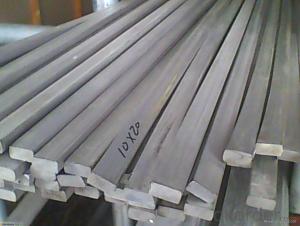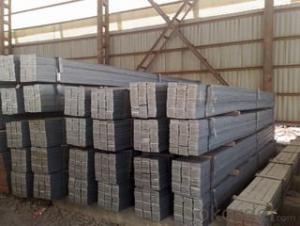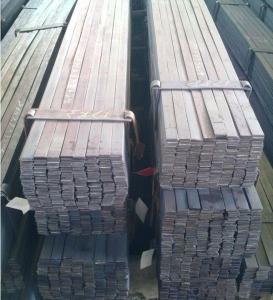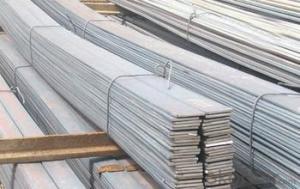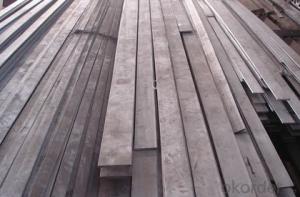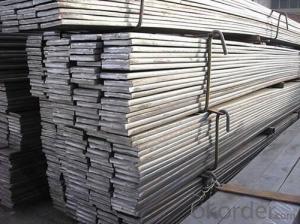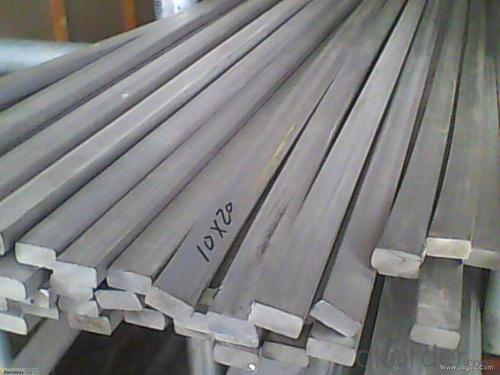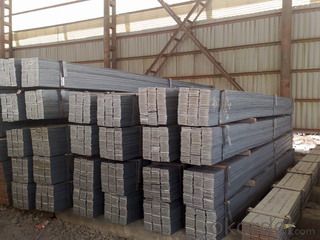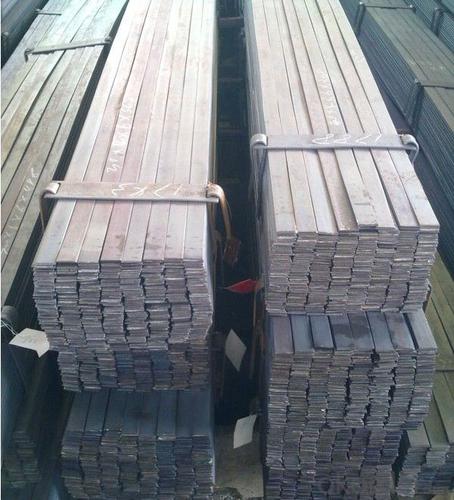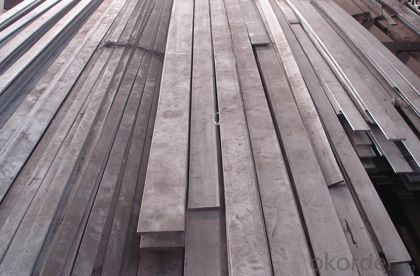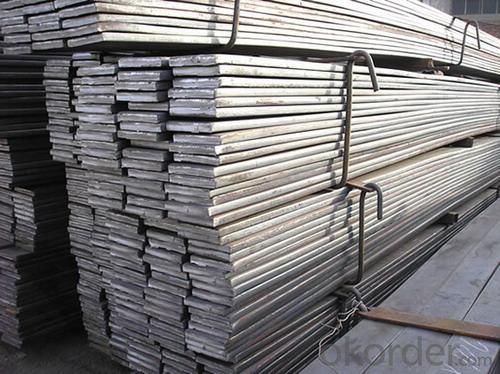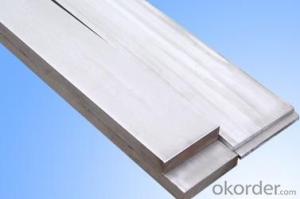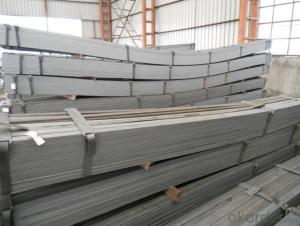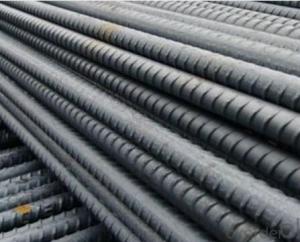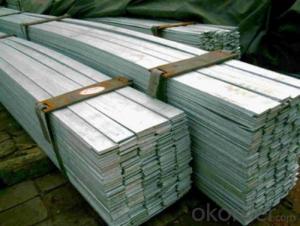Hot Rolled Grade JIS S355JR Steel Flat Bar Sizes
- Loading Port:
- Tianjin
- Payment Terms:
- TT OR LC
- Min Order Qty:
- 3 m.t.
- Supply Capability:
- 10000 m.t./month
OKorder Service Pledge
OKorder Financial Service
You Might Also Like
Specification
Hot Rolled Grade JIS S355JR Steel Flat Bar
Details of Hot Rolled Grade JIS S355JR Steel Flat Bar
Name | Hot Rolled Grade JIS S355JR Steel Flat Bar Sizes |
Shape | Flat Bar |
Standard | GB/ASTM/SAE/AISI/DIN/JIS/EN/BS |
Surface Treatment: | Black/Peeling/Polished/Machined |
Delivery Condition: | Hot Rolled or Forged/Peeled or Black Surface |
Test | SGS/UT 100% Elements Testing |
Certificate: | ISO/Mill Certificate |
Service: | 24 hours online service / |
more than 20 years trading and manufacture | |
Quality Assurance: | the third party inspection, such as SGS, BV, TUV…etc. is acceptable |
Packaging Details: | Seaworthy Packaging or as per customer's packing instruction |
steel flat bar grade | Q195,Q215,Q235 Q345,ST-37,ST-53,S275JR.S355JR,SS400 |
steel flat bar standard | GB, ASTM, AISI, EN, JIS |
steel flat bar thickness | 1.8mm-17.75mm |
steel flat bar width | 10mm-870mm |
steel flat bar length | 6m, 9m, 12m or as customer requirement |
steel flat bar technique | Slitting hot rolled steel coil |
Specification of Hot Rolled GradeJIS S355JR Steel Flat Bar
Width | Thickness | Length | Theoretical Weight |
(mm) | (mm) | (m) | (kg/m) |
20 | 2 | 6/9/12 | 0.31 |
20 | 2.5 | 6/9/12 | 0.39 |
20 | 2.75 | 6/9/12 | 0.43 |
25 | 2.5 | 6/9/12 | 0.49 |
25 | 3.75 | 6/9/12 | 0.74 |
30 | 2.5 | 6/9/12 | 0.59 |
30 | 3.5 | 6/9/12 | 0.82 |
30 | 9.75 | 6/9/12 | 2.3 |
40 | 3.5 | 6/9/12 | 1.1 |
40 | 4.75 | 6/9/12 | 1.5 |
40 | 11.75 | 6/9/12 | 3.69 |
50 | 2.75 | 6/9/12 | 1.08 |
50 | 4.5 | 6/9/12 | 1.77 |
50 | 9.75 | 6/9/12 | 3.83 |
60 | 5.5 | 6/9/12 | 2.6 |
60 | 7.5 | 6/9/12 | 3.53 |
60 | 11.5 | 6/9/12 | 5.42 |
80 | 5.5 | 6/9/12 | 3.45 |
80 | 7.5 | 6/9/12 | 4.71 |
80 | 11.75 | 6/9/12 | 7.38 |
100 | 3.25 | 6/9/12 | 2.55 |
100 | 4.75 | 6/9/12 | 3.73 |
100 | 7.5 | 6/9/12 | 5.89 |
120 | 9.75 | 6/9/12 | 9.18 |
120 | 11.75 | 6/9/12 | 11.07 |
150 | 9.75 | 6/9/12 | 11.48 |
150 | 11.5 | 6/9/12 | 13.54 |
150 | 13.5 | 6/9/12 | 15.9 |
160 | 11.75 | 6/9/12 | 14.76 |
200 | 9.5 | 6/9/12 | 14.92 |
250 | 5.75 | 6/9/12 | 11.28 |
340 | 7.75 | 6/9/12 | 20.68 |
CNBM Introduction of Hot Rolled Grade JIS S355JR Steel Flat Bar Supplier
CNBM International Corporation is the most import and export platform of CNBM group(China National Building Material Group Corporation) ,which is a state-owned enterprise, ranked in 270th of Fortune Global 500 in 2015.
With its advantages, CNBM International are mainly concentrate on Cement, Glass, Iron and Steel, Ceramics industries and devotes herself for supplying high quality series of refractories as well as technical consultancies and logistics solution.
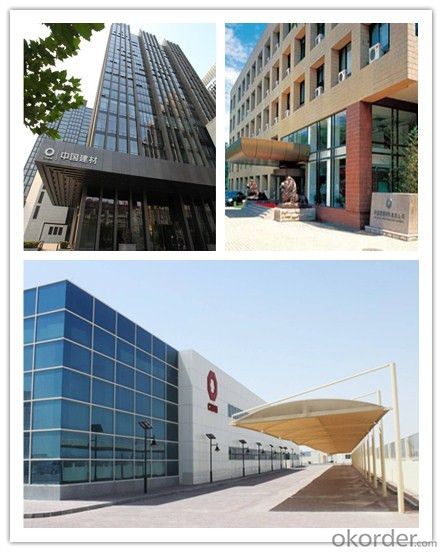
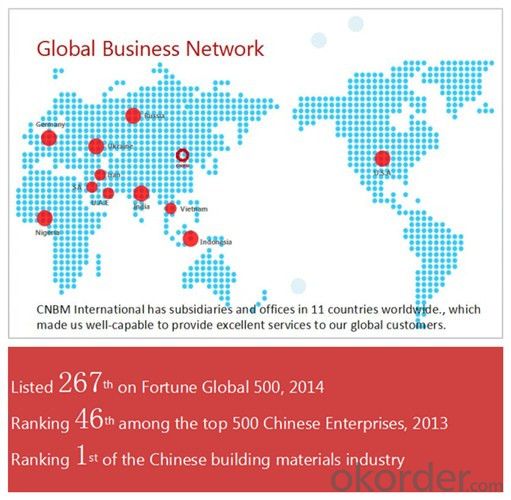
After-sale service |
|
Advantages
|
|
Packaging & Delivery Hot Rolled Grade JIS S355JR Steel Flat Bar
Packaging Detail | Sea worthy packing /as per customer's packing instruction |
Delivery Detail | 15 ~ 40 days after receiving the deposit |
Products Show
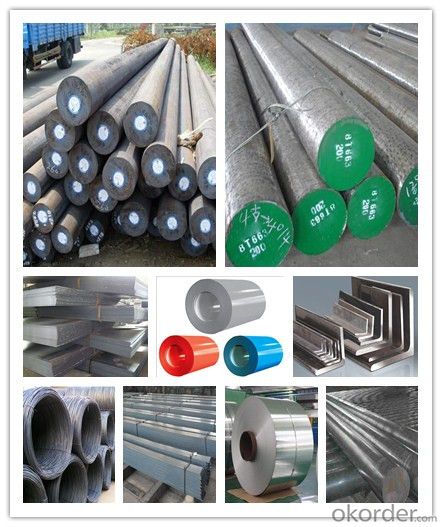
FAQ:
Are you a trading company or manufacturer? | Manufacturer |
What’s the MOQ? | 3 metric ton |
What’s your delivery time? | 15-35 days after downpayment received |
Do you Accept OEM service? | Yes |
what’s your delivery terms? | FOB/CFR/CIF |
What's the Payment Terms? | 30% as deposit,70% before shipment by T/T |
Western Union acceptable for small amount. | |
L/C acceptable for large amount. | |
Scrow ,Paybal,Alipay are also ok | |
Why choose us? | Chose happens because of quality, then price, We can give you both. Additionally, we can also offer professional products inquiry, products knowledge train (for agents), smooth goods delivery, excellent customer solution proposals. |
What's your available port of Shipment? | Main Port, China |
What’s your featured services? | Our service formula: good quality+ good price+ good service=customer's trust
|
Where are your Market? | Covering more than 160 countries in the world |
- Q: Can special steel be used in the manufacturing of household appliances?
- Yes, special steel can be used in the manufacturing of household appliances. Special steel offers enhanced strength, durability, and corrosion resistance, making it suitable for applications such as refrigerator compressors, oven heating elements, and washing machine drums.
- Q: What are the different power generation grades of special steel?
- There are various power generation grades of special steel, such as P91, P92, and P22. These grades are specifically designed to withstand high temperatures and pressures in power generation applications, ensuring the reliability and efficiency of power plants.
- Q: What are the different methods for improving the tensile strength of special steel?
- There are several methods for improving the tensile strength of special steel, including heat treatment, alloying, cold working, and grain refinement. Heat treatment involves heating the steel to a specific temperature and then rapidly cooling it, which can result in increased strength. Alloying refers to adding specific elements such as chromium, nickel, or molybdenum to the steel, which can enhance its strength properties. Cold working involves subjecting the steel to mechanical deformation at low temperatures, which can increase its strength. Grain refinement, on the other hand, involves controlling the size and distribution of the steel's crystalline structure, leading to improved strength.
- Q: How does special steel contribute to the construction aftermarket industry?
- Special steel plays a crucial role in the construction aftermarket industry by offering a wide range of benefits and applications. Firstly, special steel possesses exceptional strength and durability, making it an ideal material for constructing various infrastructure elements such as bridges, buildings, and roads. Its high tensile strength allows for greater load-bearing capacity, increasing the overall safety and longevity of structures. Additionally, special steel is known for its resistance to corrosion and extreme weather conditions, which is particularly important in construction projects. By using special steel, construction companies can ensure that their structures are better equipped to withstand harsh environments, reducing the need for frequent repairs and replacements. Moreover, special steel provides versatility in terms of fabrication and design. It can be easily molded and shaped into different forms, allowing architects and engineers to create innovative and aesthetically pleasing structures. This flexibility enables the construction aftermarket industry to meet various design requirements while maintaining structural integrity. Furthermore, special steel offers cost-effectiveness in the long run. Although the initial investment in special steel may be higher than other materials, its durability and low maintenance requirements result in reduced lifecycle costs. This makes it a cost-efficient choice for construction projects, as it minimizes ongoing expenses related to repairs and replacements. Lastly, special steel contributes to sustainability in the construction industry. Due to its strength and durability, structures built with special steel have a longer lifespan, reducing the need for frequent demolitions and rebuilds. Additionally, special steel is highly recyclable, allowing for a more sustainable approach to construction by minimizing waste and conserving resources. In conclusion, special steel plays a significant role in the construction aftermarket industry by providing superior strength, durability, resistance, versatility, cost-effectiveness, and sustainability. Its unique properties contribute to safer, longer-lasting, and more aesthetically pleasing structures, making it an essential material for construction projects.
- Q: How does special steel contribute to improving product performance under extreme conditions?
- Special steel contributes to improving product performance under extreme conditions by offering enhanced strength, corrosion resistance, and high temperature stability. Its unique composition and manufacturing processes allow it to withstand extreme temperatures, pressures, and harsh environments, ensuring the reliability and durability of products in challenging circumstances. Additionally, special steel's superior mechanical properties and ability to maintain structural integrity enable it to resist wear, fatigue, and deformation, thus improving the overall performance and longevity of products when exposed to extreme conditions.
- Q: What are the specific requirements for special steel used in the automotive piston industry?
- In order to ensure high performance, durability, and efficiency of pistons in the automotive piston industry, specific requirements for the special steel used have been established. These requirements encompass the following: 1. High tensile strength and hardness are essential for the special steel used in automotive pistons to withstand the extreme pressures and temperatures generated during combustion. 2. The steel must exhibit exceptional heat resistance properties to endure the intense heat produced by the combustion process without distorting or losing strength. 3. Given the constant friction and wear that pistons endure against the cylinder walls, the special steel used must possess good wear resistance to minimize wear and tear and extend the lifespan of the piston. 4. To ensure a secure seal between the piston and cylinder walls, the steel should have a low coefficient of thermal expansion, preventing excessive expansion and contraction during temperature fluctuations. 5. Since pistons are exposed to various corrosive elements, such as combustion by-products and engine oil, the special steel used in their manufacturing must possess good corrosion resistance to prevent premature deterioration and failure. 6. The steel should exhibit excellent fatigue resistance to withstand the repetitive stress cycles experienced by the piston during engine operation. 7. Special steel used in pistons should be easily machinable, allowing for precise dimensions and tolerances necessary for optimal performance. 8. While meeting the aforementioned requirements, special steel used in the automotive piston industry should also be cost-effective to ensure profitability for manufacturers. By meeting these specific requirements, the special steel used in the automotive piston industry contributes to the overall performance, reliability, and longevity of the piston. Consequently, this enhances the efficiency and durability of the entire engine system.
- Q: How does special steel perform in surface hardening applications?
- Special steel is known for its excellent performance in surface hardening applications. Surface hardening is a process used to increase the hardness and wear resistance of the outer layer of a metal component, while maintaining a tough and ductile core. Special steel, also known as alloy steel, is specifically designed to possess certain desirable properties, such as high strength, toughness, and resistance to corrosion and heat. When it comes to surface hardening, special steel exhibits superior characteristics compared to regular steel. Its alloying elements, such as chromium, molybdenum, and vanadium, enhance its hardenability, allowing for effective heat treatment processes like carburizing, nitriding, or induction hardening. These processes modify the surface microstructure of the steel, resulting in increased hardness and wear resistance. Special steel's ability to be hardened to a greater depth than regular steel makes it ideal for surface hardening applications. The hardened layer formed on the surface provides protection against abrasion, erosion, and fatigue, thus significantly extending the lifespan of the component. Additionally, the improved wear resistance and hardness of special steel make it suitable for applications in industries such as automotive, aerospace, and manufacturing, where components are subjected to extreme conditions and high levels of stress. Furthermore, special steel's exceptional mechanical properties make it highly durable even after surface hardening. It retains its toughness and strength, ensuring that the component can withstand heavy loads and impacts without failure. This combination of hardness and toughness is crucial for applications where both wear resistance and structural integrity are essential. In conclusion, special steel is highly effective in surface hardening applications due to its superior hardenability, wear resistance, and mechanical properties. Its ability to withstand extreme conditions and maintain its durability makes it a preferred choice for industries that require components with enhanced surface hardness and longevity.
- Q: What are the requirements for special steel used in surgical instruments?
- The requirements for special steel used in surgical instruments include high corrosion resistance, excellent mechanical properties, biocompatibility, and the ability to be sterilized without compromising its structure or properties. Additionally, the steel must be easy to shape and form, maintain its sharpness, and have a low risk of causing allergic reactions in patients.
- Q: Can special steel be used in the plumbing industry?
- Yes, special steel can be used in the plumbing industry. It is often used in the manufacturing of pipes, fittings, and other components due to its high strength, corrosion resistance, and durability. Special steel, such as stainless steel or galvanized steel, is preferred for plumbing applications where longevity and resistance to corrosion are desired.
- Q: What are the common alloys used in special steel?
- Some common alloys used in special steel include stainless steel (which contains chromium and nickel), tool steel (which contains tungsten, molybdenum, and vanadium), and high-speed steel (which contains tungsten, molybdenum, and cobalt).
Send your message to us
Hot Rolled Grade JIS S355JR Steel Flat Bar Sizes
- Loading Port:
- Tianjin
- Payment Terms:
- TT OR LC
- Min Order Qty:
- 3 m.t.
- Supply Capability:
- 10000 m.t./month
OKorder Service Pledge
OKorder Financial Service
Similar products
Hot products
Hot Searches
Related keywords
